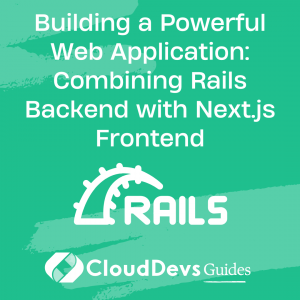Building a Powerful Web Application: Combining Rails Backend with Next.js Frontend
Table of Contents
Building modern web applications requires a combination of powerful backend frameworks and flexible frontend libraries. In this blog post, we will explore the process of building a robust web application by combining the popular Ruby on Rails framework for the backend and the Next.js framework for the frontend. We will discuss the benefits of this combination, setting up the development environment, integrating Rails APIs with Next.js, handling data fetching and rendering, routing, authentication, and deployment.
1. Understanding Rails and Next.js:
We start by providing an overview of Ruby on Rails and Next.js and their respective strengths. Rails is known for its convention-over-configuration approach, rapid development capabilities, and robust backend functionality. Next.js, on the other hand, is a powerful React framework that enables server-side rendering, static site generation, and efficient client-side routing.
2. Setting Up the Development Environment:
We guide you through setting up a development environment for building a Rails app with a Next.js frontend. We cover installing Ruby and Rails, setting up a Rails API backend, creating a new Next.js project, and configuring the necessary dependencies.
3. Integrating Rails APIs with Next.js:
We explore how to integrate Rails APIs with a Next.js frontend. We discuss approaches like RESTful API endpoints and GraphQL, highlighting their pros and cons. We provide examples of making API requests from Next.js to the Rails backend, handling authentication, and managing state between the two frameworks.
4. Data Fetching and Rendering:
We dive into data fetching and rendering techniques in Next.js. We discuss server-side rendering (SSR) and static site generation (SSG) and their benefits for performance and SEO. We showcase how to fetch data from Rails APIs and pre-render it in Next.js, as well as handling real-time updates with WebSockets.
5. Client-side Routing and Navigation:
We explore client-side routing and navigation in Next.js. We discuss the routing capabilities provided by Next.js and how to handle dynamic routing, nested routes, and query parameters. We showcase examples of building navigation menus and creating smooth transitions between pages.
6. Authentication and Authorization:
We cover authentication and authorization techniques in the combined Rails and Next.js application. We discuss popular authentication libraries and techniques for securing both the backend and frontend. We demonstrate how to implement user authentication, protected routes, and role-based access control.
7. Styling and UI Components:
We discuss styling options and UI component libraries for Next.js. We explore CSS-in-JS libraries like styled-components and CSS modules for scoped styling. We also showcase popular UI component libraries that seamlessly integrate with Next.js, allowing for rapid UI development and consistent design.
8. Deployment Strategies:
We delve into deployment strategies for a Rails app with a Next.js frontend. We discuss options like deploying the frontend and backend separately or using a unified deployment process. We cover deployment platforms, containerization, continuous integration, and strategies for scaling and managing the application in a production environment.
9. Conclusion:
By combining the power of Ruby on Rails with the flexibility of Next.js, you can build robust and performant web applications. We explored the benefits of this combination, setting up the development environment, integrating Rails APIs with Next.js, handling data fetching and rendering, routing, authentication, and deployment.
With the knowledge gained from this blog post, you’ll be well-equipped to embark on building your own web applications using the powerful combination of Rails and Next.js. So, start building and unleash the potential of this dynamic duo in your web development projects.
